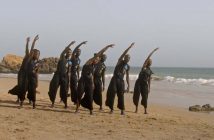Summer of ’62 is a story of torn loyalties. It is set in that type of very special moment when History senses it is time to turn a page, during this spring of 1962 before Algeria’s independence. Ali is 11, and it is through his silent eyes that we will live this moment where tensions intensify and from where are leaving those who are defeated or who have made the wrong choice. To shoot this film through a child’s eyes, Charef went to film in his hometown, Maghniya and in Tlemcen, in western Algeria. Because Ali is Mehdi Charef as a child, torn between his friendship for Nico and his other French friends who gradually leave this country in the making the colors of whose flag he has to ask his mother. A few years later, Charef joins his father who works in a factory in France, he lives in slums, becomes a metal worker himself for around fifteen years before succeeding in the film industry when he adapted his novel Tea in the Harem in 1984. He continued his depiction of immigrant life in Miss Mona (1986) and wove portraits of fascinating women in Camomille (1988), In the country of Juliets (1991) and Marie-Line (2000) where Muriel Robin supervises the mostly immigrant cleaning staff in a supermarket. « Others adventures that perhaps enabled me not to stir too much some dark spots of my memory and to leave untouched the scars of my childhood », he says about these films. With The Daughter of Keltoum (2002), he turned his focus back to Algeria with a character looking for his own history. It is this history he addresses head-on in Summer’62, « something I lived very powerfully, very painfully. » Indeed, Ali, set to a Neapolitan song sung in Arabic, witnesses French abuses: repression against his family, torture, roundups, a child thrown from a helicopter, peasants shot down for having been out a few minutes only after the curfew Algerian abuses too: the family of his friend Julie is murdered with a little Arabic Neapolitan song in the background, bomb plotters carry out their dirty work He is the dumbstruck, silent, traumatized witness of it. The group of friends gradually falls apart under the pressure of death, hatred and tragedies. The world of innocence crumbles under the violence; political oppositions prevail over human relationships. All this forms a mosaic of memories, a slightly loose patchwork whose thread is the torn loyalties that gradually set. It foreshadows the difficulty for both Ali and Algeria to have to cast aside, however painful and contradictory it was, a violent colonial graft which nonetheless inevitably became a part of them with the passage of time. A tragic divide that is far from being sorted out and which Mehdi Charef himself manages to address only now. It is probably there that lies the interest of this sensitive film, beyond the facts that it presents and which are deep down known by everyone even if the official discourse ignore them on both sides of the Mediterranean. Made with the support of the Algerian Ministry of Culture, it even has the desire to face the different facets of History which apparently wasn’t unanimously approved in Algiers. But any hopes of a new discourse in vain. Beyond the cruelty at work, it all remains very nuanced, prettily and gently directed, and eventually very consensual. Nevertheless, those from here and there who lived through these difficult and their aftermath will relate to it, and it is perhaps that which is essential.








